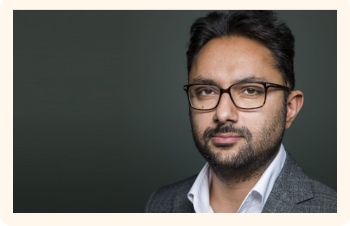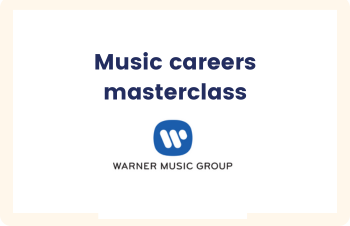Where better to visit for a Creative Access masterclass about tech than global tech company Meta? There’s something so exciting about being immersed in the world of tech at the Meta building – and it’s not just the pictures and crayons they leave out for waiting visitors in reception. Meta is the parent company of Facebook, Instagram and WhatsApp, and it’s the building in which innovations in social media, artificial intelligence, virtual reality, and the metaverse happen serving billions of users worldwide.
The masterclass panelists were experts from the team at Meta, and they shared insights into their careers, industry trends, and advice for aspiring professionals.
So, whether you’re a creative looking to break into tech or a creator wanting to stand out, here’s a recap of the brilliant discussion and some brilliant tips from them to the Creative Access community!

Speakers and their roles at Meta:
- Lauren Whilby: strategic partnership manager who works with internet personalities and beauty creators. Focuses on relationship-building with talent and helping creators develop their content, and Creative Access alumni!
- Dan Moller: head of creative shop UK, working on creative strategy, partnering with global brands. Specialises in storytelling, trend forecasting, and project management.
- Djeme Mahamat: solutions architect who transitioned from quantum physics and engineering to consulting and now solves tech challenges at Meta.
- Natalie Kelly: client solutions manager, entertainment. Supports TV and streaming brands with advertising and media, and shares expertise in collaboration and adaptability.
- Mel Rodrigues: chair of panel and CEO of Creative Access, advocating for individuals from underrepresented groups in the creative industries through recruitment, training, mentoring and more.
Advice for applicants with a non-tech background
A key theme of our discussion was the journey into tech for individuals without ‘traditional technical experience’. Each panelist shared how they leveraged transferable skills and passion to navigate their career paths.
Lauren Whilby began her career ten years ago via a Creative Access internship at a digital marketing agency, managing social media for music artists like RAYE and Craig David. She leveraged her transferable experience in talent management to transfer to the tech industry and advised the audience that although the jargon in job descriptions can be intimidating, it’s crucial to focus on the key skills listed and demonstrate how that applies to you. She reassured attendees that many in her team at Meta don’t have technical backgrounds, making it clear that being adaptable and showcasing your strengths are more important!
Whilst Djeme Mahamat has more of a scientific background, he still had to adapt for his role at Meta. Djeme shared a unique transition from studying quantum physics to building cloud platforms and solving technical challenges. He noted that his problem-solving mindset and ability to collaborate with tech teams became invaluable in his current role as a solutions architect.
Natalie Kelly shared her journey from an internship at Google to managing major TV and streaming accounts at Meta. She said that people skills and learning agility were crucial for her success, stating that adaptability in a fast-changing tech landscape makes all the difference. “It feels like I have a different job every year,” she shared, reflecting on the constant development of her role in an ever-evolving industry.
Dan Moller brought a creative edge from his previous experience in visual effects and university departments. He highlighted the importance of storytelling, communication, and project management – skills that carried him into his role as a creative strategist. At Meta’s creative shop, he combines data insights with creative strategies to craft impactful campaigns for global brands.
Top Tip: Many companies, including Meta, offer free training programmes like Blueprint to help individuals gain a foothold in the industry. Experimenting with AI tools and staying curious about emerging technologies were also highlighted as ways to stay ahead.

Advice for content creators
For aspiring content creators, the panelists provided practical tips to navigate the challenges of building a distinctive personal brand.
Lauren stressed that personality is key. In crowded niches like fashion and beauty, creators need to showcase their authentic selves. The shift from polished, filter-perfect content to relatable, low-fi storytelling reflects changing audience preferences. Lauren encouraged creators to tag brands they use and not hesitate to reach out for collaborations.
Natalie echoed this sentiment, noting a “huge shift” in what audiences want. Brands need to move away from overly polished content and embrace a more authentic, accessible aesthetic. Creators who can adapt to this trend will have a better chance of standing out.
For those building a social media presence, Lauren advised starting without delay. “Film yourself often, get comfortable speaking to the camera, and learn basic editing skills,” she suggested. Consistency is vital – whether that means posting regularly or setting a content creation schedule. Importantly, she clarified that the quality of your content and confidence in storytelling matter more than follower counts.
Future-ready skills – what will matter most?
In an industry shaped by rapid technological advancements – particularly AI – the panelists emphasised four critical skills that professionals and creators should develop:
- Storytelling: Crafting compelling narratives remains a timeless skill. At Meta, data is often used to tell stories that resonate with specific audiences, from analysing trends to adapting formats like reels or stories.
- Critical thinking: Tackling challenges creatively and solving problems are essential for navigating an ever-evolving landscape.
- Communication: In large organisations like Meta, clear and effective communication ensures alignment across teams and projects.
- Curiosity: Staying informed about industry trends and being open to experimenting with new tools are vital for long-term success.
As Dan pointed out, resilience and adaptability are equally important, especially as AI reshapes industries. Learning to work with AI, such as experimenting with Meta’s tools, can provide unexpected insights and opportunities.
Representation, inclusion and remote work
The panelists celebrated how technology and platforms like Meta are breaking down barriers. Lauren spoke about working with creators from under-represented communities, including Disabled influencers, while Mel highlighted how remote work is democratising the industry to embrace talent from across the country (or world!). The rise of virtual collaboration has reduced geographical barriers, ensuring talent from regions outside major creative and tech hubs like London can still thrive.

Advice for introverts and mature applicants
The panel also answered questions from the audience about personality and experience levels:
- For introverts who don’t enjoy maintaining their own social media, Lauren reassured that a personal online presence isn’t a requirement. Instead, focus on building one-on-one connections and developing niche expertise.
- Natalie added that there are countless roles in tech for those who prefer data and measurement over client-facing tasks.
For mature applicants, Dan emphasised letting skills and experience shine, without worrying about age: “If you have a story to tell, be proud to tell it.”
Best advice from the panelists
The session closed with memorable words of wisdom from each speaker who were asked for the best advice they’ve ever received:
- Natalie: “Closed mouths don’t get fed. Take the risk – getting a no isn’t the end of the world.”
- Djeme: “Don’t ask for permission; ask for forgiveness!”
- Dan: “Done is better than perfect.”
- Lauren: “If you’re a woman, don’t wait for a job where you can do everything – go for it.”
- Mel: “Nothing is wasted. Every experience, even the unsuccessful ones, teaches you something.”
After the panel concluded, the panelists and attendees headed for the snacks and drinks to network the night away!
Interested in a role in tech or another creative industry? Check out our opportunities board.




